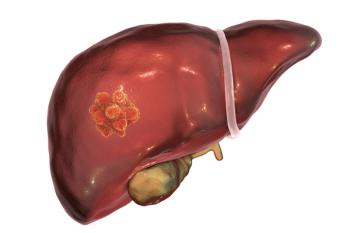
Combination therapies with teclistamab exhibited a superior overall response rate vs teclistamab monotherapy in relapsed/refractory multiple myeloma.

Your AI-Trained Oncology Knowledge Connection!


Combination therapies with teclistamab exhibited a superior overall response rate vs teclistamab monotherapy in relapsed/refractory multiple myeloma.

Ivonescimab plus chemotherapy reduced the risk of disease progression or death by 48% vs chemotherapy alone in patients with EGFR-mutant NSCLC.

Survival benefits were observed across most post-hoc subgroups treated with anlotinib plus penpulimab, particularly among those with high-risk disease features.

The decision is based on results from the phase 1/2 SOHO-01 trial evaluating the agent in patients with advanced HER2-mutant non–small cell lung cancer.

Patients who received 70 Gy of radiotherapy had a significantly longer duration of treatment than those who received less than 70 Gy.

Clinical data from a phase 1 trial evaluating EBC-129 in solid tumors will be presented at the 2025 American Society of Clinical Society Annual Meeting.

Select adverse effects examined during the initial 24 weeks of treatment occurred at a rare or occasional frequency and mild to moderate severity.

Ten of 12 patients with metastatic pancreatic ductal adenocarcinoma given the recommended phase 2 dose of the combination regimen had a response.

Less radical surgery did not come at the expense of postoperative metrics, including 30-day readmissions, surgical findings, or receipt of adjuvant therapy.

Among patients with rectal cancer who underwent total mesorectal excision following SCRT plus camrelizumab and chemotherapy, the 3-year OS rate was 93.3%.

The positive CHMP opinion is based on results from the phase 1b/2 FELIX trial evaluating obe-cel in relapsed/refractory B-cell ALL.

Eight votes were cast against the favorability of talazoparib and enzalutamide in the first-line setting for patients with metastatic castration-resistant prostate cancer.

Given an unmet need for efficacious therapies against ALK-positive NSCLC, experts discuss optimal ALK TKI sequencing for patients with this disease.


Antitumor activity was observed in patients with gastroesophageal adenocarcinoma treated with the combination regardless of chemotherapy type.

For patients with right-sided CRC tumors, no significant progression-free survival difference was observed between the cetuximab and FOLFIRI-only groups.

The trial initiation is based on phase 1/2 IDeate-PanTumor01 trial results presented at the 2022 and 2023 European Society for Medical Oncology Congress.

No new safety signals were observed with bevacizumab, atezolizumab, carboplatin, and etoposide in extensive-stage small cell lung cancer.

The safety profile of daratumumab plus bortezomib, melphalan, and prednisone remained stable at follow-up, and no new safety signals were observed.

CRS and ICANS occurrence were comparable for patients with relapsed/refractory multiple myeloma 75 years and older vs those younger than 75.

Among 18 patients with central nervous system lymphoma treated with the ibrutinib/nivolumab combination regimen, 3 had remission beyond 2 years.

The safety profile of loncastuximab tesirine plus glofitamab was consistent with the known profiles of the individual agents.

Ten-year data from the phase 3 APHINITY trial will be presented at the 2025 European Society for Medical Oncology Breast Cancer Congress.

The FDA designation follows an orphan drug designation granted by the European Medicines Agency for THE001 in patients with soft tissue sarcoma.

The safety profile of TFOX was consistent with data reported in previous studies, and no new safety signals were identified.

Data from the POTOMAC trial evaluating durvalumab in NMIBC will be presented at a future medical meeting and shared with global regulatory authorities.

Patients with MSS tumors diagnosed with metastatic CRC did not experience enhanced OS outcomes with frontline ICI therapy compared with chemotherapy.

Findings from the phase 2 RAMP 201 trial support the FDA approval of avutometinib plus defactinib in low-grade serous ovarian cancer.

The phase 2 Actuate 1801 part 3b trial results evaluating elraglusib with GnP in metastatic PDAC will be presented at the 2025 ASCO Annual Meeting.

Neoadjuvant trastuzumab deruxtecan/THP showed an enhanced safety profile vs the standard-of-care regimen in patients with early-stage breast cancer.